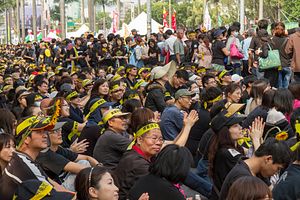In the aftermath of the unsuccessful referendum for independence in Scotland, Mainland China’s Minister of Taiwan Affairs Zhang Zhijun wrote an article titled “Making cross-strait peaceful development an unstoppable trend” in the Qiushi Journal on Sept. 20. In his article, Zhang summarized five guidelines that Secretary General of the Chinese Communist Party Xi Jinping set as the party’s Taiwanese policy. In the article’s section on peaceful cross-strait development, Zhang emphasizes that Taiwanese independence is the real threat to cross-strait peace. The fact that Hong-Kong-based China Review News used exactly that phrase to head its reprint of Zhang’s article conveys the intended message.
The substance of this article and the timing of its publication indicate that the CCP leadership is both confident in and worried about its cross-strait relations. Accordingly, fostering peaceful cross-strait development and curbing Taiwanese independence will be pursued hand in hand. However, such a dichotomous process will be a tough task in reality. Often the soft approach of giving unilateral market concessions to win over the Taiwanese people is more than offset by harsh measures to dwarf Taiwan’s international standing for the sake of curbing its independence. This scenario has been going on for the past two decades. Recently, a window has opened to achieve both goals at once: a meeting between Xi and Taiwanese President Ma Ying-jeou at the upcoming APEC summit in Beijing.
The contribution of a Ma-Xi meeting to peaceful development is obvious. As Ma makes clear, his Mainland policy is about institutionalizing cross-strait appeasement, which aims to consolidate the peaceful development of cross-strait relations and to make Taiwan a true peacemaker on the world scene. Though the meeting between Zhang and Taiwan’s Mainland Affairs Council (MAC) Minister Wang Yu-chi marked a milestone along the road towards that goal, if a Ma-Xi meeting were to take place, it would further elevate cross-strait relations, with an impact that would last even after Ma steps down in 2016.
For his part, Xi has chosen to appeal to emotional rhetoric when it comes to Taiwan, stressing that “both sides of the Taiwan Strait are one family” and “people on both sides are like-minded,” hoping to win the hearts and minds of the Taiwanese people. Unfortunately, judging from the anti-China sentiment that erupted from the Sunflower Student Movement, a considerable majority of Taiwan’s populace do not share that goodwill towards people across the strait, and worry about living under Beijing’s control. In this light, a Ma-Xi meeting at the APEC Summit would vindicate Xi’s rhetoric and possibly boost Beijing’s image in the minds of the Taiwanese.
Equally important, a Ma-Xi meeting could possibly curb Taiwanese independence, especially at this juncture. For the past two years, Beijing has cleverly elevated its dealings with the Democratic Progressive Party (DPP) by actively engaging the green camp leaders, even to the extent of allowing Tainan’s mayor, William Lai, to broach a number of sensitive issues, including Taiwanese independence, without misfire during his June visit to Shanghai. However, when it comes to substantial issues such as exchanging liaison offices and Taiwan’s FTAs with other trading partners, Beijing becomes reluctant and mute. The result is that right now those who use proactive rhetoric against Beijing are considered heroes while those who appeal to working with Beijing are losing credit. If this trend continues, the moderates on cross-strait relations will lose ground in Taiwan over time and cross-strait relations will once again become volatile and dangerous. On its face, a symbolic summit between leaders could show Beijing’s willingness to face difficult issues, and that in turn could ease tempers.
Thirteen years ago, with the APEC Summit set to be held in Shanghai, then Taiwanese President Chen Shui-bian had high expectations, hoping to attend the meeting in person. At that time, he had kept to his “four noes and one without” principle and praised the idea of an “integration dictum” with mainland China. Unfortunately, these actions failed to talk Beijing into permitting Chen to attend the summit. China even rebuffed his suggestion that he send his vice president in his stead. Ten months later, Chen made his “one country on each side” declaration and cross-strait relations began to deteriorate radically, continuing to worsen for the remainder of his time in office. If Chen had gone to Shanghai in 2001, would he have become a peacemaker? That is an unknown, but what is certain is that with a Ma-Xi meeting held within about a year of the next presidential election, an improved cross-strait atmosphere could reduce the possibility of an antagonist coming to power in Taiwan.
There is no question that Beijing worries about the recognition of Taiwan’s legal status that might result from a Ma-Xi meeting at APEC. Ultimately, this is a test of Beijing’s ability to face difficult issues. If it chooses to hold the meeting, the summit could give cross-strait relations a boost along the lines of peaceful development. Perhaps then, Zhang’s pledge could be fulfilled.
Chen-Dong Tso is associate professor of political science at National Taiwan University.

































